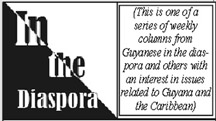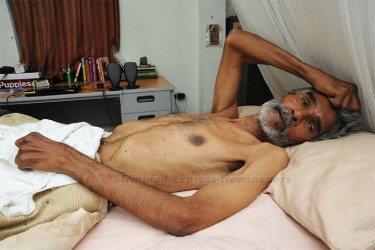By Gabrielle Hosein
Gabrielle Jamela Hosein is a feminist, activist, poet and Lecturer at the University of the West Indies, and also writes a column in the Trinidad and Tobago Guardian

The vindictive ad hominem attacks against those involved in Highway Reroute have not ceased. Perhaps the most shocking was an ad that appeared in the October 18th edition of the Trinidad Guardian, titled “Trinidad and Tobago discovers human reptile.” A clear reference to Dr. Kublalsingh’s protest, the text ran: “The Kub-lal. An unusual human reptile discovered here on the pavement basking in the limelight everyday outside the Prime Minister’s Office, defies medical explanation by surviving without food and water for weeks without any sign of health issues.” The ad was removed from the newspaper the following day, and the Guardian apologized to Dr. Kublalsingh on October 20th. A Trinidad Express report of October 25th revealed that Ross Advertising was the agency responsible for the ad; in an interview with the Sunday Express, the firm’s owner Ernie Ross insisted that his company did not produce the ad’s content but agreed to run it after being approached by a group, citizens4dhighway. According to the Express, Ross advertising is regularly contracted to undertake advertising for the Trinidadian government and also played a key co-ordinating role in the second anniversary event of the ruling People’s Partnership earlier this year. Guyanese readers will also know Ernie Ross as this country’s honorary consul to Trinidad and Tobago, and also as the individual to whom former President Bharrat Jagdeo sold his Goedverwagting home for G$120 million a few years ago.

The ad campaign has clearly backfired, leading many to wonder how much taxpayer dollars have been handed over to Ross Advertising and any other agencies for ads supporting the government’s position. And to ask what the purpose of such cheap and petty personal attacks are. As Gabrielle Hosein wrote in her blog, “Any government that avoids transparency is hiding something. Any government that pits citizens against each other is hiding something. Any government that pays Ernie Ross, the government’s biggest paid Ad Man, millions of our money to fool us up about the right questions and answers are when we have been asking the right questions and not getting answers to them yet, is hiding something. Any government that turns to spin is hiding from truth. The million dollar spin is coming to distract us from the billion dollar questions, to turn us against each other and to allow the government’s Goliath to make us give in. Stay focused on getting both solutions to transportation suffering and solutions to government secrecy. This is about our money, our communities, our environment and our future.”
And in response to official musings about how Kublalsingh could go for more than five weeks without really taking anything, Trinidadian columnist and social activist Sunity Maharaj wrote in the Trinidad Express, “I do not need him to die in order to accept the evidence of his ravaged body dwindling before my eyes. And so, I’m not detained by the debate about whether he’s cheating or not. What stops me in my tracks is the sheer indecency, vitriol and lack of human compassion emanating from those in opposition to him, many of whom claim to live the Hindu way. Doubt is one thing; disrespect is quite another. I make the point about Hindus because so much of Dr. K’s method invokes Hindu tradition…there is no doubt that the environmentalist has adopted Gandhi’s doctrine of Satyagraha, defined by Gandhi himself as the vindication of truth, not by the infliction of suffering on one’s opponent, but on oneself…In the case of the highway from Debe to Mon Desir, it makes perfect sense for Dr K to choose the strategy of Satyagraha in challenging the Persad-Bissessar Government, because at the heart of the issue is the lie that the United National Congress (UNC) perpetrated on the people of that community by flip-flopping on the highway. If the highway is the act of progress that this government claims it is, why then did the UNC not support the highway while in Opposition? Why did it initiate the idea of re-routing the highway in leading the protest against it? Of course, these are rhetorical questions. The reason the UNC protested the highway in opposition, and embraced it in government is the usual cheap politics of expediency and exploitation…But entering the byzantine world of political opportunism is a pointless distraction. The imperative now, as it has been from the start, is information. The single most important initiative to provide the public with the facts for arriving at an informed position on the highway was aborted when the Armstrong Report fell like a heavy stone, sinking to the bottom of the public agenda, leaving behind nary a ripple.
Next week Trinidadians hope to hear from the National Infrastructure Development Company (overseeing the highway construction) on implementation of recommendations from the Armstrong report. Will we see some breakthrough this week? And what are the longer-term lessons for us across the Caribbean about engagement, commitment, collectivity, humility, discipline, vision and the hard work to make truly inclusive societies? In her contribution below, Gabrielle Hosein ends with a moving, hopeful twist on Martin Carter’s This is the Dark Time My Love. Here the soldiers are those dedicated to change, and it is they who haunt and stalk the narrow corridors of power, promising that a new tomorrow will come.
I told myself that I’d be there to support Wayne Kublalsingh’s second hunger strike, even if I disagreed with it as a strategy, because you don’t leave soldiers to fight on battlefields alone.
You might disagree with their battle plan, wonder at their choices, get vex that they don’t follow your suggestions, and anticipate the victories as well as onslaught of wounds, but soldiers who decide to die fighting deserve more than dismissive derision.
I mean soldiers who put everything into the trenches of citizen organizing for more than a decade for no personal gain, and who have fought without guns, mudslinging or dogs of war for communities’ sustainable needs. Soldiers who ran out big polluter industries which would have gorged on our precious island resources, exported the profits, and left our children along the South-West peninsula mired in waste. I mean soldiers who won’t give up our rights to state accountability for any version of development, and who won’t let politicians conveniently and falsely make us choose.
While these soldiers step into the deep fog ahead, steeled by will, experience and principle, there is work for us to do.
This is my tenth column on the Highway Reroute Movement since November 2012, every word as personal as it is political. I’ve often visited the handful of older folk, sitting peaceably outside the Prime Minister’s office for more than 200 days, forever imprinting in my mind that image of their little tent facing the façade of prime ministerial authority. Listening to the women of the HRM marvel at never imagining quiet, rural mothers could challenge the PM, I’ve seen examples of empowerment for young Indian women.
I came of age under citizen soldiers like Sheila Solomon, Angela Cropper, Norman Girvan, Norris Deonarine, Rhea Mungal, Desmond Allum, Michael Als, and more who are no longer with us. Their ghosts stalk our apathy. They remind that history is made by individuals handing on a sense of people power to another generation. They forewarn that some successes may only be an edging back of government secrecy and domination, some will take more than our lifetime to achieve.
Through these weeks, I’ve listened to people saying the ‘environmental movement’ should just give up on this as if giving up is what Caribbean people do, as if one tenth of our budget isn’t a public issue. I’ve listened to others divide south from north Trinidad as if a nation is best guided by the spin of divide and rule. I’ve seen million dollar government propaganda distract from the billion dollar questions.
Perhaps naively, I hoped that, against such a Goliath, we could win with our little slingshots of truth. I’ve also listened to Sunity Maharaj sagely caution me that, if I think back to the Amerindians, to the long struggle since colonization, I’d also remember that crushing, arbitrary defeat after defeat is part of our legacy.
I could write about the dilemmas of choosing a primary school where teachers will not beat my child, and the worry of sitting in parent-teacher meetings hearing that her confidence doesn’t match her vocabulary, but I find myself more concerned with the complexity of power and its hidden curriculum, less likely to produce solidarity than indifference and cynicism.
Our work ahead is to decide what this moment will mean. When mega projects cost us more than they should, ecologically, financially and socially, I ask myself what my daughter Ziya will think of the sides I took, and my own accountability. May soldiers also help her learn how to educate, advocate and mobilize. In your own future dark time, Zi my love, may they still haunt those aiming at your dreams.





